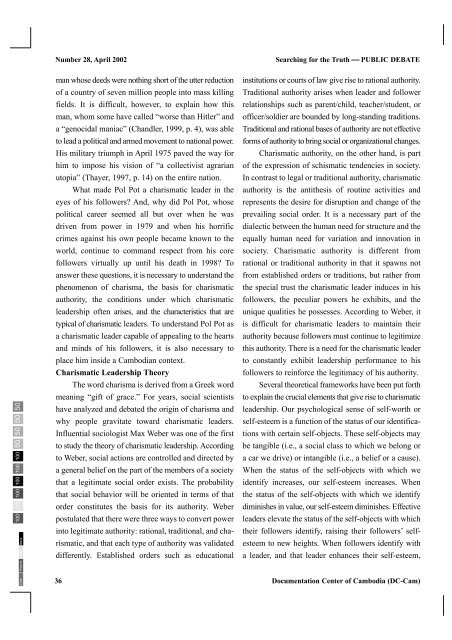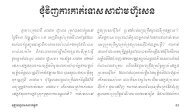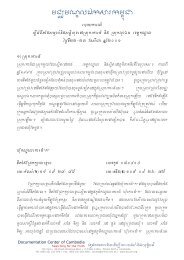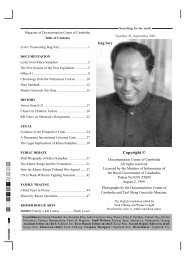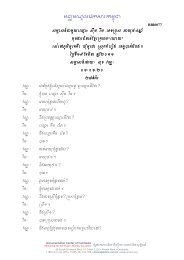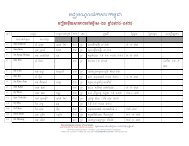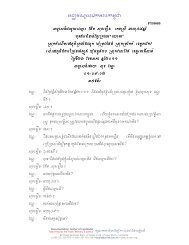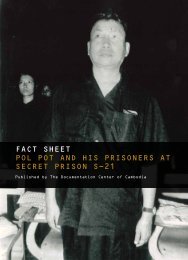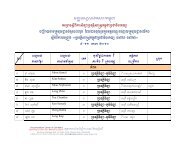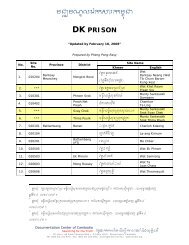Searching for the truth Issues 28 - Documentation Center of Cambodia
Searching for the truth Issues 28 - Documentation Center of Cambodia
Searching for the truth Issues 28 - Documentation Center of Cambodia
Create successful ePaper yourself
Turn your PDF publications into a flip-book with our unique Google optimized e-Paper software.
100 100 100 100 100 100 50 50 50 50<br />
Black<br />
Yellow<br />
Magenta<br />
Cyan<br />
Number <strong>28</strong>, April 2002<br />
man whose deeds were nothing short <strong>of</strong> <strong>the</strong> utter reduction<br />
<strong>of</strong> a country <strong>of</strong> seven million people into mass killing<br />
fields. It is difficult, however, to explain how this<br />
man, whom some have called “worse than Hitler” and<br />
a “genocidal maniac” (Chandler, 1999, p. 4), was able<br />
to lead a political and armed movement to national power.<br />
His military triumph in April 1975 paved <strong>the</strong> way <strong>for</strong><br />
him to impose his vision <strong>of</strong> “a collectivist agrarian<br />
utopia” (Thayer, 1997, p. 14) on <strong>the</strong> entire nation.<br />
What made Pol Pot a charismatic leader in <strong>the</strong><br />
eyes <strong>of</strong> his followers? And, why did Pol Pot, whose<br />
political career seemed all but over when he was<br />
driven from power in 1979 and when his horrific<br />
crimes against his own people became known to <strong>the</strong><br />
world, continue to command respect from his core<br />
followers virtually up until his death in 1998? To<br />
answer <strong>the</strong>se questions, it is necessary to understand <strong>the</strong><br />
phenomenon <strong>of</strong> charisma, <strong>the</strong> basis <strong>for</strong> charismatic<br />
authority, <strong>the</strong> conditions under which charismatic<br />
leadership <strong>of</strong>ten arises, and <strong>the</strong> characteristics that are<br />
typical <strong>of</strong> charismatic leaders. To understand Pol Pot as<br />
a charismatic leader capable <strong>of</strong> appealing to <strong>the</strong> hearts<br />
and minds <strong>of</strong> his followers, it is also necessary to<br />
place him inside a <strong>Cambodia</strong>n context.<br />
Charismatic Leadership Theory<br />
The word charisma is derived from a Greek word<br />
meaning “gift <strong>of</strong> grace.” For years, social scientists<br />
have analyzed and debated <strong>the</strong> origin <strong>of</strong> charisma and<br />
why people gravitate toward charismatic leaders.<br />
Influential sociologist Max Weber was one <strong>of</strong> <strong>the</strong> first<br />
to study <strong>the</strong> <strong>the</strong>ory <strong>of</strong> charismatic leadership. According<br />
to Weber, social actions are controlled and directed by<br />
a general belief on <strong>the</strong> part <strong>of</strong> <strong>the</strong> members <strong>of</strong> a society<br />
that a legitimate social order exists. The probability<br />
that social behavior will be oriented in terms <strong>of</strong> that<br />
order constitutes <strong>the</strong> basis <strong>for</strong> its authority. Weber<br />
postulated that <strong>the</strong>re were three ways to convert power<br />
into legitimate authority: rational, traditional, and charismatic,<br />
and that each type <strong>of</strong> authority was validated<br />
differently. Established orders such as educational<br />
36<br />
<strong>Searching</strong> <strong>for</strong> <strong>the</strong> Truth ⎯ PUBLIC DEBATE<br />
institutions or courts <strong>of</strong> law give rise to rational authority.<br />
Traditional authority arises when leader and follower<br />
relationships such as parent/child, teacher/student, or<br />
<strong>of</strong>ficer/soldier are bounded by long-standing traditions.<br />
Traditional and rational bases <strong>of</strong> authority are not effective<br />
<strong>for</strong>ms <strong>of</strong> authority to bring social or organizational changes.<br />
Charismatic authority, on <strong>the</strong> o<strong>the</strong>r hand, is part<br />
<strong>of</strong> <strong>the</strong> expression <strong>of</strong> schismatic tendencies in society.<br />
In contrast to legal or traditional authority, charismatic<br />
authority is <strong>the</strong> anti<strong>the</strong>sis <strong>of</strong> routine activities and<br />
represents <strong>the</strong> desire <strong>for</strong> disruption and change <strong>of</strong> <strong>the</strong><br />
prevailing social order. It is a necessary part <strong>of</strong> <strong>the</strong><br />
dialectic between <strong>the</strong> human need <strong>for</strong> structure and <strong>the</strong><br />
equally human need <strong>for</strong> variation and innovation in<br />
society. Charismatic authority is different from<br />
rational or traditional authority in that it spawns not<br />
from established orders or traditions, but ra<strong>the</strong>r from<br />
<strong>the</strong> special trust <strong>the</strong> charismatic leader induces in his<br />
followers, <strong>the</strong> peculiar powers he exhibits, and <strong>the</strong><br />
unique qualities he possesses. According to Weber, it<br />
is difficult <strong>for</strong> charismatic leaders to maintain <strong>the</strong>ir<br />
authority because followers must continue to legitimize<br />
this authority. There is a need <strong>for</strong> <strong>the</strong> charismatic leader<br />
to constantly exhibit leadership per<strong>for</strong>mance to his<br />
followers to rein<strong>for</strong>ce <strong>the</strong> legitimacy <strong>of</strong> his authority.<br />
Several <strong>the</strong>oretical frameworks have been put <strong>for</strong>th<br />
to explain <strong>the</strong> crucial elements that give rise to charismatic<br />
leadership. Our psychological sense <strong>of</strong> self-worth or<br />
self-esteem is a function <strong>of</strong> <strong>the</strong> status <strong>of</strong> our identifications<br />
with certain self-objects. These self-objects may<br />
be tangible (i.e., a social class to which we belong or<br />
a car we drive) or intangible (i.e., a belief or a cause).<br />
When <strong>the</strong> status <strong>of</strong> <strong>the</strong> self-objects with which we<br />
identify increases, our self-esteem increases. When<br />
<strong>the</strong> status <strong>of</strong> <strong>the</strong> self-objects with which we identify<br />
diminishes in value, our self-esteem diminishes. Effective<br />
leaders elevate <strong>the</strong> status <strong>of</strong> <strong>the</strong> self-objects with which<br />
<strong>the</strong>ir followers identify, raising <strong>the</strong>ir followers’ selfesteem<br />
to new heights. When followers identify with<br />
a leader, and that leader enhances <strong>the</strong>ir self-esteem,<br />
<strong>Documentation</strong> <strong>Center</strong> <strong>of</strong> <strong>Cambodia</strong> (DC-Cam)


